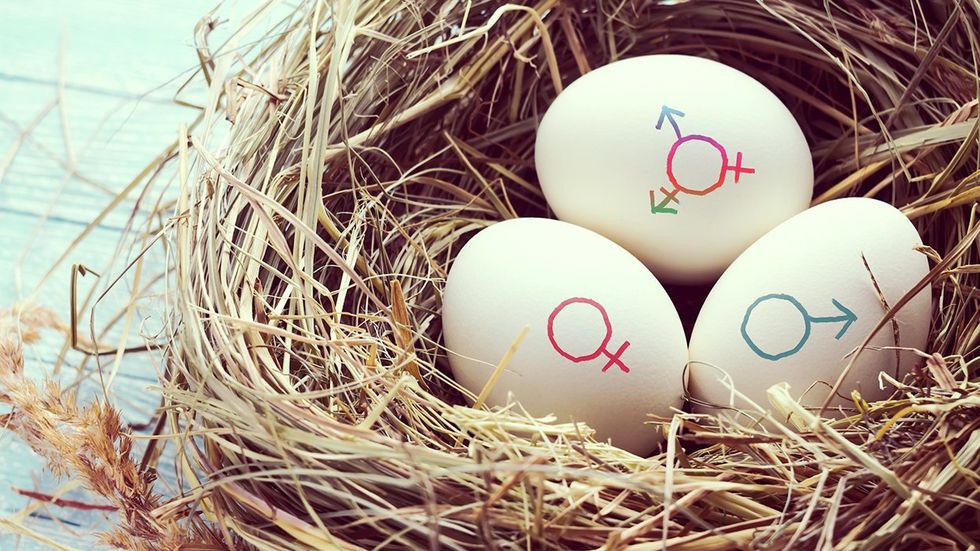Like any other weekend, I participated in the time-honored brunch tradition on Sunday. But this brunch was unlike any other: speckled with pastel-colored boiled eggs, chocolate-shaped bunnies, and treats, tucked in a small wicker basket at the tables, Easter Sunday brunch was once again upon us. Sitting at my table, I immediately noticed the basket contained three eggs decorated in pastel pink, blue, and white.
The restaurant I have been a regular at for some time now is aware of my gender identity, so I couldn't help but interpret the basket as a subtle, unspoken recognition of International Transgender Day of Visibility, which coincided with Easter Sunday this year.
Perhaps a brief history lesson is in order: Easter, first observed in the 2nd century AD, is a movable feast. The date of this holy day changes annually based on calculations that have sparked debate and 'controversy' ever since. Furthermore, the date varies between Western and Eastern Christian practices, with the latter's Easter celebrations held later; with few exceptions, Easter is observed on the same day.
Since 2009, communities have joyfully gathered to celebrate Transgender Day of Visibility (TDOV), an annual day every March 31st. Whereas Transgender Day of Remembrance in November solemnly pays tribute to lives taken too soon by transphobic violence, the Day of Visibility is a vibrant commemoration of life and a beautiful gesture of giving flowers to those who desire to make themselves visible in a world that wants them to remain invisible.
This year, a rare and significant calendrical coincidence brought Easter Sunday and TDOV together, setting the stage for a cultural and political skirmish that feels as misplaced as wearing white after Labor Day. The right-wing uproar, led by figures such as Republican House Speaker Mike Johnson and personalities like Caitlyn Jenner, accused the Biden administration of its acknowledgment of TDOV and sought to overshadow the Christian celebration of Easter, an idea as ludicrous as it is unfounded.
After reading just a bit of the conversation on social media, I had to put my phone. I didn't want to spend my Sunday evening frustrated and angry at individuals taking a jab at an observance day, a fixture in our semi-official queer calendar. But was I surprised? No. In the realm of politics and personal agendas, it appears that conservatives, with their penchant for controversy, have once again chosen to ignore the essence of both these observances in favor of sensationalism and "winning" a cultural "war" they started for likes and votes.
Easter, a celebration of resurrection and renewal, and TDOV, a day dedicated to recognizing and affirming the visibility and rights of transgender individuals, share a common thread: transformation. Yet, instead of embracing this commonality, certain politicians and media personalities have chosen to weave a narrative of division and displacement, as if acknowledging one diminishes the significance of the other.
The irony of their outcry is as palpable as the scent of fresh spring rain. It reminds us of the selective memory that often characterizes political discourse, where yesterday's support can become today's condemnation.
Juxtaposed with her previous praise, Caitlyn Jenner's recent criticism of TDOV is a prime example of this inconsistency. In 2017, Jenner lauded the day, recognizing its importance in the journey of visibility and acceptance for transgender individuals. Yet, in a bewildering pivot, she now echoes the baseless attacks against the day, betraying the very essence of what TDOV stands for.
Witnessing these attacks feels like a personal affront, a dismissal not only of our identities but of the very fabric of love and acceptance that should bind us as a society. With its focus on division, the conservative narrative overlooks the transformative power of love, a force as rejuvenating and life-affirming as the Easter message itself.
In the face of such adversity, it's imperative to remember that the fight for visibility and equality is not just a trans issue; it's a human issue. It's about recognizing every individual's inherent worth and dignity, irrespective of gender identity. TDOV and Easter, in their essence, celebrate the transformative power of love and acceptance. These ideals transcend political agendas and cultural divides.
As we navigate the tumultuous waters of an election year, it's crucial to believe that love, in its purest form, has the power to bridge the widest of divides. This message resonates deeply within the hearts of those who have experienced the transformative power of acceptance, whether through the affirming embrace of a loved one or the acknowledgment of one's true self.
Ultimately, it's not about which holiday claims the calendar or which political figure shouts the loudest; it's about recognizing the common humanity that binds us all. It's about understanding that transformation, whether witnessed in the rebirth of spring, the resurrection celebrated on Easter, or the visibility and acceptance championed on TDOV, is a testament to the enduring power of love.
And in this complex, ever-changing life narrative, love will always have the final word.
Marie-Adélina de la Ferrière is the Community Editor at equalpride, publisher of The Advocate, Out, Out Traveler, Plus, and Pride.com.
Want to share an opinion on an issue? Have an inspiring personal story to tell? Visit advocate.com/submit to learn more.
Views expressed in The Advocate's opinion articles are those of the writers and do not necessarily represent the views of The Advocate or our parent company, equalpride













































































